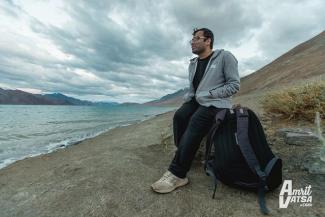
Having hope for a cure for an incurable disease is essential as it gives a purpose to be alive but making it the centre of your world is where the problem lies, writes Vineet Saraiwala.
My brother and I have retinitis pigmentosa (RP), a degenerative eye condition in which vision deteriorates as age progresses. There is currently no scientific cure for my condition but I am optimistic of a cure with the rapid advancements in research happening across the world. Some medical conditions are just incurable and the sooner it is accepted the better. You can consult 10 doctors or organise a pooja or donate money to the charity or drink cow’s urine or simply be under the supervision of a sage, but you cannot wish away the truth - that incurable diseases are incurable. Please have hope, belief, faith, spirituality or whatever you call it but let’s not overdo it. I have listed below five common blind faiths or mumbo jumbo or unproven treatment and the effect it has on us, largely drawn from my own and my friends’ experiences.
Related: A Medical Oncologist: How To Spot Fake Medical News
- There are no magic drugs descending from the sky - My parents went to innumerable religious centres and have given up rice and orange for the past several years in the hope that with this sacrifice, we would get a cure for retinitis pigmentosa. They have consulted untold jyotishis, sages, tantrics and have even tried to understand our previous births, but all in vain. The miracles will be done by the scientists and not Gods, so sit back and relax. We respect the sacrifices and the self-denial but this guilt of overdoing and not knowing when to stop on finding a cure which does not exist makes us more depressed than happy.
- Don’t fall for miraculous social media videos - We have often received advice from strangers, relatives and society on possible cure in the form of miraculous videos which we have been instructed to follow. I’ll give you an example. For instance, there was a video of a blind person called Satyajit, who claimed the he saw the rising sun for 6 months continuously and finally regained all his sight. Or how a Chinese woman was cured because of passing electric vibrations in her eye or videos of a magic herb solving all miseries. I have also heard of the popular treatment in Cuba where eye surgery, ozone therapy, electric stimulation and drugs help arrest the degenerative vision. A lot of things on the internet might be fake or a trap for you. They have little or no scientific validation. The claims made have not been verified and are largely unproven therapies. So be discriminative and careful.
- Alternate medicines also have limitations - Following a healthy diet or practising yoga or taking ayurvedic ointments or exercising are all great way to maintain chronic conditions. Alternate medicines help you to stay positive but don’t feel dejected if you don’t get tangible results out of it. Some incurable diseases have their own limitations and it might not cure your condition but will definitely contribute to your overall wellbeing. For instance, I have mastered 3 stages of Reiki in order to cure my eyes. The chronic condition remains the same but I have found it quite effective for mild headaches and coughs.
- Clinical trial does not mean immediate cure - We often read about research in journals of clinical trials in mice which is an encouraging development. But there are many more steps and scrutiny required before this development can be commercialised. This has a long lead time - so patience is the key.
- Don’t compare different patients/conditions - I go to an Ayurvedic retreat every year and the common pastime of patients and caregiver is to compare different patients with similar conditions. One caregiver remarked that her daughter had a fabulous recovery with the medicines in 15 days and his fellow resident was not getting the same benefit because they are not following the right instructions. It’s really hard to predict the reasons for one patient’s recovery compared to another but again every condition and body reacts differently and passing judgements on people is the easiest thing to do.
Having an incurable disease should not stop us from dreaming big. It’s a condition which needs to be navigated and cherished with care. Having hope for a cure is essential as it gives a purpose to be alive but making it the centre of your world is where the problem lies. The incurable disease should never stop you from conquering anything irrespective of there is a cure in sight or not.
Destiny is Controlled by my Mind, not my Eyes
(Vineet Saraiwala leads projects for a private firm and is contributing in mainstreaming inclusion across India in his own small way. An alumnus of the Indian Institute of Management, Bangalore (IIMB), he is an avid trekker, marathoner, and an endurance cyclist. He loves reading non-fiction books and charting unconventional paths to make the world a better place.)






